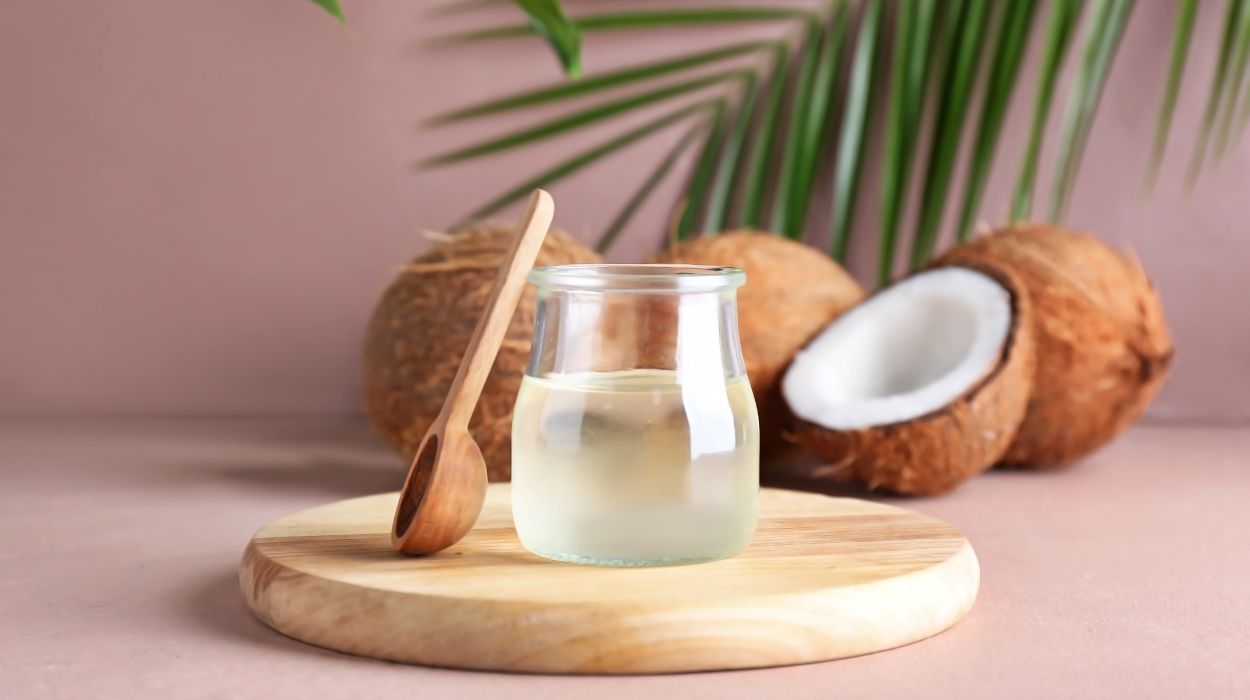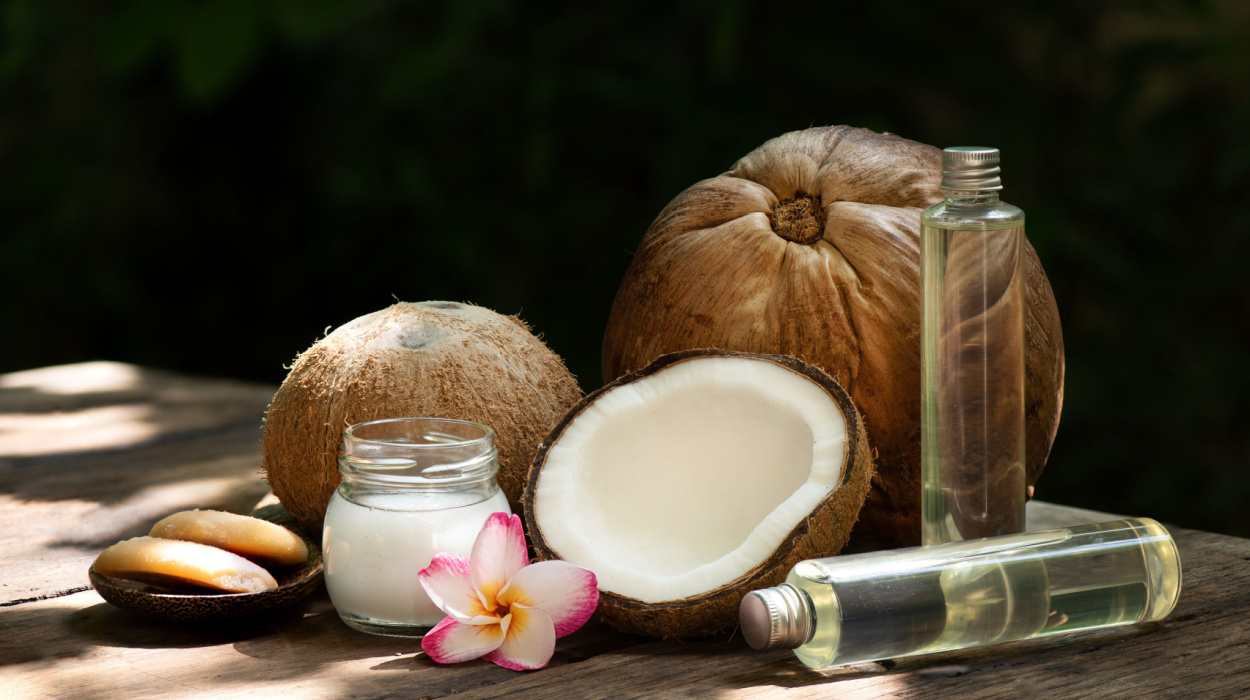The popularity of coconut oil and coconut-derived MCT oil has boomed in recent years, especially among those following ketogenic and paleo diets. Coconut oil is touted as a healthy fat for cooking, skin and health care, and even weight loss. However, coconut oil is high in saturated fat,[1] so can it really help you shed excess weight?
Read on to learn more about the potential health benefits and risks of consuming coconut oil and if you can use coconut oil for weight loss.
Is Coconut Oil Good For Weight Loss?
Coconut oil is an edible oil that, when consumed in moderation, may aid short-term weight loss. This is because coconut oil is high in medium-chain triglycerides, which promote satiety and may enhance exercise tolerance.
However, these results remain controversial, and long-term studies are needed to understand the effects fully. Studies suggest that regular coconut oil consumption is associated with an increased risk of metabolic syndrome with a corresponding increase in blood triglyceride levels.
Coconut Oil For Weight Loss: Does It Work?

Over the last decade, coconut oil has become popular due to various potential health benefits. The proposed uses of coconut oil range from cooking to teeth-whitening, hair care, and lip balm. Many people also claim that coconut oil helps them lose weight, but scientific results are mixed.
Coconut oil is very high in calories[2] and saturated fat, so eating coconut oil liberally won’t help you lose weight – if anything, it’ll have the opposite effect.
Cooking with coconut oil instead of other oils won’t decrease the caloric content of your meals. Including too much in your diet may even raise your cholesterol levels.[3] Despite this, coconut oil – when consumed in moderation – may still aid weight loss due to its high percentage of medium-chain fatty acids.
Medium-chain fatty acids or medium-chain triglycerides – known as MCTs for short – makeup 62% of coconut oil’s[4] total fatty acid content. Because of its high MCT content, coconut oil may aid weight loss more than other oils.
MCTs may promote weight loss by decreasing energy intake,[5] although this study found that it doesn’t seem to affect appetite. However, another study found that coconut oil reduced hunger[6] and the desire to eat significantly more than olive oil. Unfortunately, this was a small study in 20 men, so we still need bigger studies to understand the effects.
Does Coconut Oil Increase Exercise Tolerance?
Eating MCTs could also improve your exercise tolerance. Mice fed with MCTs[7] were able to run longer than those fed regular food. This suggests that including MCTs in your diet could improve your exercise stamina, allowing you to increase the duration of your workout sessions. Increasing your level of physical activity can help you burn more body fat[8] and, therefore, reduce your overall body weight.
To conclude, while studies have shown short-term effects on weight loss, they remain controversial and need to be followed by long-term human trials.
Other Health Benefits of Coconut Oil
Consuming coconut oil may promote short-term weight loss, but this isn’t its sole health benefit. Coconut oil also has antimicrobial, anti-inflammatory, and antioxidant properties that could benefit your dental health, improve your skin, and reduce your risk of chronic diseases.
Oil pulling is an alternative dental hygiene practice in which edible oil is swished around the mouth and then spat out. Proponents of coconut oil pulling claim it can reduce harmful bacteria levels, alleviate bad breath, reduce inflammation, and lower the risk of gum disease and cavities. And there’s evidence for these oral hygiene benefits.
Coconut oil might improve dental health because it’s the highest natural source[9] of lauric acid – a medium-chain triglyceride with anti-inflammatory and antimicrobial properties. People who swished coconut oil after brushing their teeth saw a significant decrease[10] in cavity-causing bacteria. This supports the claim that coconut oil can kill mouth bacteria and, consequently, reduce your risk of tooth and gum problems.
Coconut oil also has antioxidant and anti-inflammatory properties[11] that could benefit your long-term health.
Virgin coconut oil contains powerful antioxidants called phenolic compounds.[12] Antioxidants neutralize free radicals, which are unstable oxygen molecules that attack and damage cells and DNA. Eating an antioxidant-rich diet can help mitigate this damage and reduce your risk of serious medical conditions[13] like heart disease, chronic kidney disease, lung disease, neurodegenerative disease, and cancer.
The anti-inflammatory effects of virgin coconut oil also have promising applications in skin care. Applying coconut oil directly to the skin could prevent damage to the skin barrier,[14] which retains skin moisture and protects it[15] from free radicals and environmental pollutants. Therefore, using coconut oil to strengthen the skin barrier could help keep your skin looking smooth, healthy, and youthful.
Nutritional Value Of Coconut Oil
One tablespoon of unrefined coconut oil contains 120 calories,[16] 14 grams of fat, no fiber, and only trace amounts of vitamins and minerals. Of the 14 grams of fat in a tablespoon of coconut oil, 12 grams are saturated fat, and the other 2 grams are unsaturated fat.
Saturated fat is widely considered less healthy than unsaturated fat. This is because saturated fat is known to increase[17] cholesterol levels and, therefore, the risk of heart disease.
Unsaturated or monounsaturated fats, abundant in most other plant oils, are associated with a much lower risk of heart disease. Indeed, research suggests that coconut oil increases cholesterol levels[3] significantly more than other plant-based oils.
You are not advised to consume coconut oil if you already have high blood cholesterol.
How To Use Coconut Oil For Weight Loss

Maintaining a calorie deficit is of utmost importance if you are trying to lose weight, and eating too much oil can significantly increase your calorie intake. So, when incorporating coconut oil into your weight loss diet, use it sparingly.
The easiest way to incorporate coconut oil into a balanced diet is by replacing other types of oil. Refined coconut oil is the best coconut oil for cooking because it has a neutral scent and flavor. It can be used to replace other neutral oils, like sunflower oil, without altering the flavor or calorie content of your meal.
Unrefined coconut oil has a strong coconut flavor and scent. So, if you like the taste of coconut, you can add it raw to drinks and protein shakes. Coconut milk can also be added to coffee and other drinks and has its own set of health benefits thanks to its antioxidant properties.[18]
Remember, coconut oil is more suitable for mid- rather than high-temperature cooking. This is because the smoke point of coconut oil is only 350 °F,[9] making it unsuitable for deep frying.
Health Benefits Of Coconut Flesh
If you don’t want the calories that come with coconut oil, you can still get more coconut in your diet by eating the fruit. Fresh coconut meat and dried coconut meat are both rich in medium-chain fatty acids[7] and fiber. High-fiber diets are associated with weight loss,[19] so eating coconut in moderation could contribute to your weight loss efforts.
Like coconut oil, coconut flesh is high in calories[20] and saturated fats but, thanks to its fiber content, is less calorie-dense. This means you can eat more coconut meat than oil before you max out your daily calorie intake, so it may be better for people on a weight loss journey.
Best Time To Take Coconut Oil For Weight Loss
The best time to take coconut oil for weight loss results depends on your diet habits. If you’re following a reduced-calorie diet, you can substitute your usual cooking oil for refined coconut oil without increasing your calorie intake. Therefore, the best time for you to eat coconut oil is during meals; you would usually use sunflower oil, olive oil, or any other type of plant oil.
If you are intermittent fasting – otherwise known as IF – to lose weight, you can break your IF with coconut oil by adding a spoonful to your coffee. Alternatively, you can do this before you begin fasting to reduce hunger.[6]
For those on a ketogenic diet, coconut oil won’t break ketosis[21] – MCTs can actually help induce ketosis. Coconut oil is 100% fat and contains no carbohydrates, so it’s highly suitable for a high-fat, low-carb keto diet. You can use coconut oil or MCT oil to increase your fat intake by adding it to coffee or smoothies, roasted veggies, or stir-fries.
If you want to use coconut oil for oil pulling, you can do this after you brush your teeth in the morning. The recommended method[22] for oil pulling is to use one tablespoon of oil, swish it between your teeth for 15-20 minutes, then spit the oil out.
For people who want coconut oil benefits without the calories, some diet pills contain MCTs. MCT oil supplements and other belly fat burners may help you lose weight by enhancing exercise performance.[7] Therefore, using these dietary supplements could help you increase the intensity of your workouts.
Conclusion
Coconut oil is a popular plant oil with a plethora of potential health benefits, but is coconut oil good for weight loss? Small amounts of coconut oil may contribute to weight loss, although we need longer-term studies to fully understand the weight loss effects.
This is because coconut oil is rich in MCTs. Some people claim that eating coconut oil or pure MCT oil can reduce hunger and help them eat fewer calories. MCTs may also increase exercise tolerance, allowing you to up the length and intensity of your fat-burning workouts.
However, over recent years, the topic of coconut oil has been subject to a lot of misinformation.[23] Many people believe coconut oil is healthier than other oils when, in reality, coconut oil may be detrimental to cardiovascular health.
Coconut oil is pure fat and is very high in calories. It also contains a high proportion of saturated fats. If eaten in excess, saturated fats may raise cholesterol levels and increase your risk of cardiovascular disease.
Frequently Asked Questions
Coconut oil won’t burn fat, but it could increase your exercise tolerance and help you up the intensity of your workouts. When combined with a healthy diet, regular exercise[24] can lower your body fat percentage and, therefore, reduce belly fat.
Coconut oil is pure fat, so eating too much can lead to weight gain. Coconut oil also contains a high percentage of saturated fat and may raise[25] LDL cholesterol and HDL cholesterol levels, which can increase your risk of heart disease.
Oil won’t reduce belly fat. However, oils rich in monounsaturated fats, like virgin olive oil, are considered more nutritious[26] and better for promoting heart health.
The rate at which a person burns fat depends on myriad factors including calorie intake, physical activity, and medical status. Most people can lose weight with regular exercise and a calorie-restricted diet, but some medical conditions can inhibit weight loss.
There is no evidence to suggest coconut oil will speed up your metabolism, though it may increase your exercise tolerance. Therefore, eating coconut oil may help you increase the length and intensity of your workout.
You should eat coconut oil sparingly if you’re trying to lose weight, as coconut oil is high in calories and saturated fat. If you’re restricting your calorie intake, just add a teaspoon of coconut oil to your coffee.
 Evidence Based
Evidence Based
